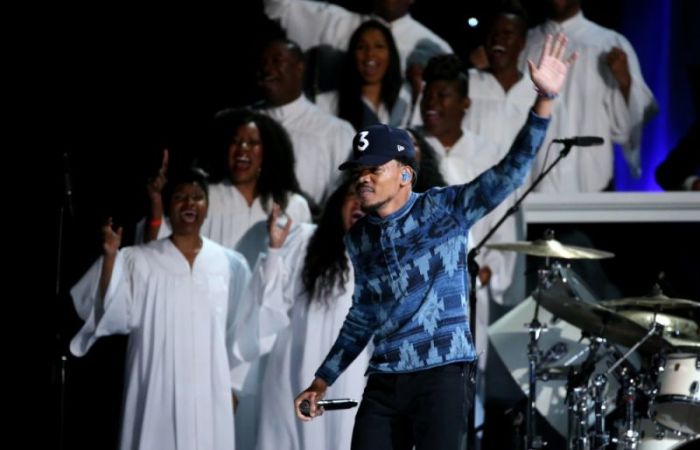3 Ways Chance the Rapper Represents Millennial Christianity

CeeLo Green confused the Grammys with a Halloween party, Twenty One Pilots thought the stage was a changing room, and Chance the Rapper turned the platform into a pulpit.
Sunday night, Chance the Rapper became the first artist to win a Grammy without selling physical copies of his music — or selling much of his music at all. He won three Grammys (best new artist, best rap album and best rap performance), defeating the likes of Kanye West, Drake and DJ Khaled. The 23-year-old rapper from Chicago releases his songs online for free.
However, it was his performance last night that had people talking. Joined by Kirk Franklin, Francis and the Lights, Tamela Mann and a gospel choir, Chance performed a combination of "How Great" from Chris Tomlin and "All We Got" from his latest mixtape. He also added in little snippets of "No Problem" and "Blessings."
Chance the Rapper represents millennial Christianity in three ways:
1. He hasn't signed with any label.
Increasingly millennials are detached from traditional institutions. Much attention is given to millennials leaving the church, but millennials are leaving institutions as a whole.
They leave traditional institutions but join up-start religious non-profit organizations. The number of religious non-profits increased significantly over the past 15 years. According to a 2013 report, 73 percent of millennials volunteered for a nonprofit organization in the previous year. Almost four out of five did so because of their passion for the cause. More than half were motivated by their interest in meeting like-minded volunteers. And nearly 83 percent of young Americans donated money to a nonprofit.
2. He is rough around the edges.
For a listener who grew up in the Bible Belt, his lyrics rock the proverbial boat and splash you with some vulgar language. However, profanity is often utilized in communication in order to shock and/or make an emphatic point. While one might be shocked at the profanity, one could be equally shocked at his points that highlight systemic racism in our culture.
I am not trying to justify his language, but I am informing you about the rationale behind his language. He is rough around the edges but is committed to making God's kingdom come, God's will be done, on Earth as it is in heaven. He doesn't extend invitations to join him at church, but rather brings the message of the church into the culture.
According to one survey, roughly two-thirds of millennial employees swear at work. Approximately a third of millennials said swearing can help strengthen a team. Thirty-six percent said cursing reflects passion for their work.

3. He understands the urgency of now.
Chance's restlessness and eagerness are infectious, causing you to shift in your seat in a rhythmic fashion. He has a way with words and his words have their way with you.
"God give me one sentence more
Maybe I just gotta get suspended more?
Hash tag it, get mentions for it
Make you love it, get it trending more."
His songs have a palpable energy that is characteristic of rap. Not all millennials rap, but many share the urgency that characterizes rap.
Seventy-four percent of millennials believe they can make a difference in the world now. According to a Deloitte study, more than 50 percent of millennials say they would take a pay cut to find work that matches their values. Ninety percent want to use their skills for good.
Chance the Rapper's faith looks different than that of previous generations. Then again, we have come a long way from fishermen and tax collectors to the millennial Christians of today. But the mission remains the same.




























